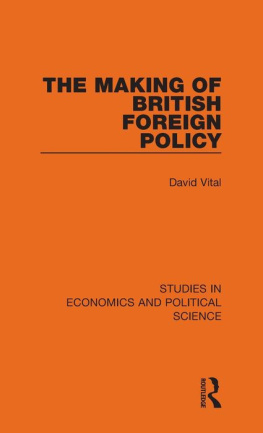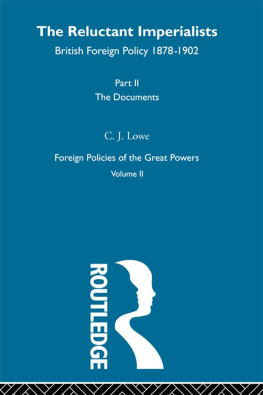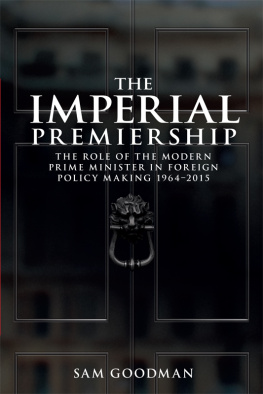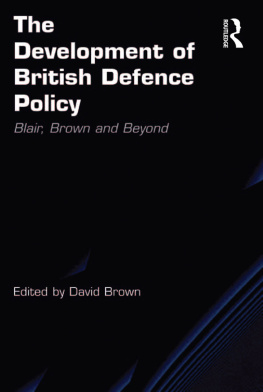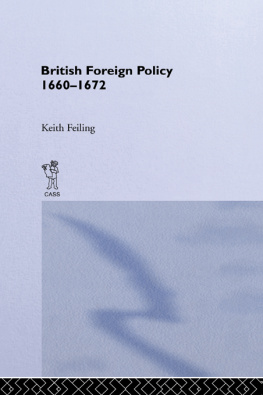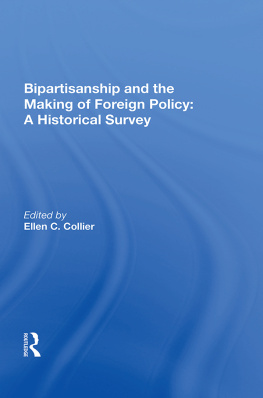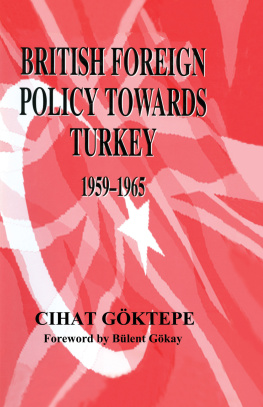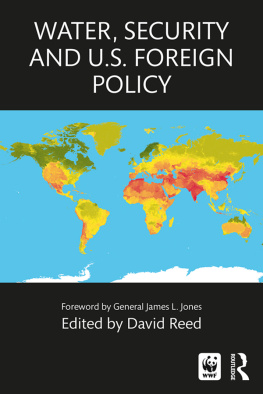Studies in Economics and Political Science
Volume 10
The Making of British Foreign Policy
First published in 1968 by George Allen & Unwin Ltd
This edition first published in 2022
by Routledge
2 Park Square, Milton Park, Abingdon, Oxon OX14 4RN
and by Routledge
605 Third Avenue, New York, NY 10158
Routledge is an imprint of the Taylor & Francis Group, an informa business
1968 George Allen & Unwin Ltd
All rights reserved. No part of this book may be reprinted or reproduced or utilised in any form or by any electronic, mechanical, or other means, now known or hereafter invented, including photocopying and recording, or in any information storage or retrieval system, without permission in writing from the publishers.
Trademark notice: Product or corporate names may be trademarks or registered trademarks, and are used only for identification and explanation without intent to infringe.
British Library Cataloguing in Publication Data
A catalogue record for this book is available from the British Library
ISBN: 978-1-03-212459-9 (Set)
ISBN: 978-1-00-322951-3 (Set) (ebk)
ISBN: 978-1-03-212511-4 (Volume 10) (hbk)
ISBN: 978-1-03-212519-0 (Volume 10) (pbk)
ISBN: 978-1-00-322498-3 (Volume 10) (ebk)
DOI: 10.4324/9781003224983
Publishers Note
The publisher has gone to great lengths to ensure the quality of this reprint but points out that some imperfections in the original copies may be apparent.
Disclaimer
The publisher has made every effort to trace copyright holders and would welcome correspondence from those they have been unable to trace.
The Making of British Foreign Policy
David Vital
Author of The Inequality of States
FIRST PUBLISHED IN 1968
Second Impression 1971
This book is copyright under the Berne Convention. All rights are reserved. Apart from any fair dealing for the purpose of private study, research, criticism or review, as permitted under the Copyright Act, 1956, no part of this publication may be reproduced, stored in a retrieval system, or transmitted, in any form or by any means, electronic, electrical, chemical, mechanical, optical, photocopying, recording or otherwise, without the prior permission of the copyright owner. Enquiries should be addressed to the publishers.
George Allen & Unwin Ltd 1968
isbn 0 04 327028 x (cased)
0 04 327029 x (paper)
printed in great britain
in 10 on 11pt Plantin Type
by redwood press limited
trowbridge & london
Foreword
This book is intended to serve a dual purpose. It represents an attempt to set out the processes of foreign policy-making in the United Kingdom; and, at the same time, it is designed to introduce readers to some of the problems of foreign policy analysis. The former purpose is, certainly, the more immediate, but it has seemed to me best to tackle it within an explicit theoretical framework in the hope that a discussion, however limited, of the general theoretical problems involved would serve both to elucidate the account of the specifically British topics and make the approach on which the study as a whole is founded as unambiguous as possible. For it is, of course, quite fruitless to attempt to analyze a complex subject of this kind with all its intricate political, institutional and sociological ramifications except on the basis of some view of what is or is not significant, what does or does not constitute a valid explanation (however the term explanation may be conceived), and what specific phenomena may properly be selected out of the mass of observable data by way of illustration and example all of which, taken together, help to make up the coherent picture or scheme or theoretical system in terms of which the analysis proceeds. Certainly, the tighter the theoretical scheme, and the more satisfactory it is in purely intellectual terms, the greater the danger that the study on which it is based will edge away from political and institutional life as the plain man knows it and take off, so to speak, for flight into the realms of scholasticism. But where there is no scheme at all, there by the same token there is no explanation and analysis except in the historians or journalists sense of specific and unique event being consequent upon specific and unique incident. Since the present study is nothing if not an attempt at nailing down the general and the recurrent, the latter type of explanation is of relatively little value and the risks attendant on theorizing must, in consequence, be borne.
These difficulties are common to political analysis in all sectors of the field. Foreign policy analysis offers certain problems of its own. These stem, in part, from the difficulty of setting boundaries to the subject. The foreign policy of country A is not merely the resultant of certain processes of deliberation within the governmental institutions of A. It is also, to suggest only one of many possible addenda, a function remote or immediate of the foreign policies of countries B and C and D with which A interacts internationally. And the complete account of As foreign affairs should properly include fully as detailed an account of the foreign affairs of B, C and D. But this is both beyond the bounds of normal human ability and less than crucial in a study of this (modest) scope.
But in part, too, analysis of the foreign policy processes of Britain or any other modern state entails the consideration of some matters which no academic observer can be entirely privy to. Secrecy, discretion, and be it said misinformation, characterize all modern diplomacy and will no doubt continue to do so until the Wilsonian millenium of open covenants of peace openly arrived at is upon us. It might, perhaps, be argued that, accordingly, only an insider who has participated personally in the processes described here over an extended period should attempt a discussion of them. Unfortunately, insiders tend to avoid the kind of overview presented here, preferring to stick to the respectable and certainly smoother furrows of autobiography, on the one hand, and the description of formal institutions, on the other. Both are valuable. Neither really deals with still less answers the questions with which this essay is concerned. So for all these difficulties there seemed at least minimal justification for such an attempt as this to interpret what is, without any doubt at all, an extremely intricate, if not arcane subject even by somebody who in more senses than one stands outside the processes by which British foreign policy is actually made.
It will be noted that this essay is concerned with the making of foreign policy. It is not an account, still less a critique, of British foreign policy as such. Nor could it be. One could, perhaps, attempt a retrospective, historical account of what British foreign policy was on some very specific issue at a specific point in time; but one cannot talk usefully about British foreign policy in general, and in the present tense. One of the points that this book attempts to make, if only implicitly, is that there is no such animal, nor could there be. Instead, there are, so to speak, a great many policies on a great many matters, coexisting, often uncomfortably and uncertainly, at various levels of definition, priority and recognition. If an overall picture is wanted and it is quite definitely with the overall picture that this book deals the matter must be appropriate to being cast in terms which will be reasonably general, yet still sufficiently valid. And for such a purpose only the


